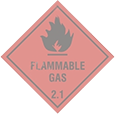We get asked the same series of questions quite a bit so we thought we would put the most common questions and answers in the one convenient place for you to read...
What Is LPG?
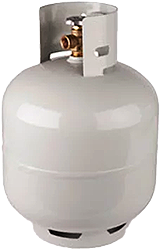 LPG stands for Liquefied Petroleum Gas. Like petrol, LPG is a hydrocarbon-based fuel, mainly composed of butane and propane. It is non corrosive, heavier than air and in its normal state is a vapour. When compressed LPG becomes a liquid. A distinctive chemical odorant is added to LPG to alert people in the event of a gas leak. Whilst stored under pressure in an approved cylinder, it is both a gas and a liquid, the LPG is in a gas/vapour form at the top of the cylinder and the liquid LPG is in the bottom.
LPG stands for Liquefied Petroleum Gas. Like petrol, LPG is a hydrocarbon-based fuel, mainly composed of butane and propane. It is non corrosive, heavier than air and in its normal state is a vapour. When compressed LPG becomes a liquid. A distinctive chemical odorant is added to LPG to alert people in the event of a gas leak. Whilst stored under pressure in an approved cylinder, it is both a gas and a liquid, the LPG is in a gas/vapour form at the top of the cylinder and the liquid LPG is in the bottom.
LPG is used for many uses, vehicles, gas BBQ's, industrial purposes, tools and more.
LPG is becoming more common as an alternate fuel to power vehicles, the LPG is stored in the rear of a vehicle in a very strong steel cylinder with a number of safety valves. Independant tests carried out in Europe have shown that in an accident, cars using LPG as a fuel source give occupants up to 3 times more time to leave the vehicle in the event of a fire in comparison to petrol.
Why Do I Need To Test My LPG Cylinder?
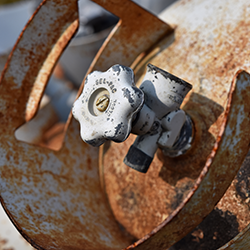 On the surface, your cylinder may look fine or have some surface rust showing, maybe you dropped it, but, you really do not know if your cylinder is safe to refill and use. We have had many cylinders that have looked to be in reasonable condition but have failed to pass testing for various reasons. Not only is the integrity of the actual cylinder tested, but the valve as well.
On the surface, your cylinder may look fine or have some surface rust showing, maybe you dropped it, but, you really do not know if your cylinder is safe to refill and use. We have had many cylinders that have looked to be in reasonable condition but have failed to pass testing for various reasons. Not only is the integrity of the actual cylinder tested, but the valve as well.
Gas cylinders may be compromised by mechanical damage, corrosion, excessive heat and rust and cylinder valves may wear or deteriorate over time. The use of damaged and or out of test date cylinders is illegal and can be dangerous.
An LPG gas cylinder should not be filled if it is past the 10 year test date, in NSW it is illegal for an approved filling stations to fill a cylinder if it is out of test or looks to be in bad condition. Australian Standards are very clear on testing requirements. You can check for the date on the neck of most cylinders, on an inspection / manufacture plate.
If you would like to enquire about having your LPG Gas Cylinder(s) tested and inspected, please get in touch and we will be happy to discuss.
How Often Does LPG Cylinder Testing & Servicing Need To Be Conducted?
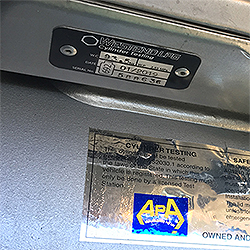 Under Australian Standards, LPG gas cylinders are required to be tested at least every 10 years, this ensures that each and every LPG gas Cylinder is deemed to be safe for both use and refilling.
Under Australian Standards, LPG gas cylinders are required to be tested at least every 10 years, this ensures that each and every LPG gas Cylinder is deemed to be safe for both use and refilling.
You can inspect the cylinder for the last inspection stamp yourself, on a large number of LPG gas cylinders the date of last test/manufacture is stamped into the protective valve collar, or possibly in the foot ring at the bottom of the cylinder. Vehicle LPG gas cylinders usually have it stamped on an inspection plate.
It is not just the integrity of the cylinder itself that is tested, the valve and other hardware (in the case of automotive cylinders) are fully inspected and tested as well. At the end of the day, you want peace of mind that your cylinder is safe to use.
If you think your LPG gas cylinder is due for it's 10 yearly test or you are not sure, please get in touch and we will be happy to discuss.
Can You Come To Me?
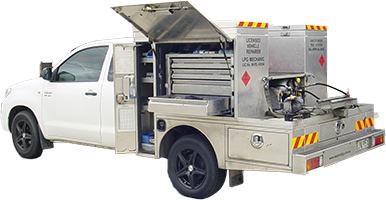 Westend LPG Cylinder Testing is a Licenced Motor Mechanic Mobile workshop that specialises in Automotive LPG Cylinder Testing and repairs and is regarded as one of the most experienced *Gas Cylinder Test Stations* in NSW. Our Sydney based Test Station is mobile and provides onsite Gas Cylinder Testing to all suburbs in the Sydney Metro and surrounding areas.
Westend LPG Cylinder Testing is a Licenced Motor Mechanic Mobile workshop that specialises in Automotive LPG Cylinder Testing and repairs and is regarded as one of the most experienced *Gas Cylinder Test Stations* in NSW. Our Sydney based Test Station is mobile and provides onsite Gas Cylinder Testing to all suburbs in the Sydney Metro and surrounding areas.
We have been doing LPG gas cylinder inspections and repairs for around 20 years with thousands of mobile tests completed in that time. You can trust us when it comes to looking after your automotive LPG system as well as your domestic and industrial LPG gas cylinders.
If you would like to book an appointment, please get in touch and we will be happy to discuss your requirements.
Got more questions or want to book a testing appointment, fill in our enquiry form and we will get in touch soon.


